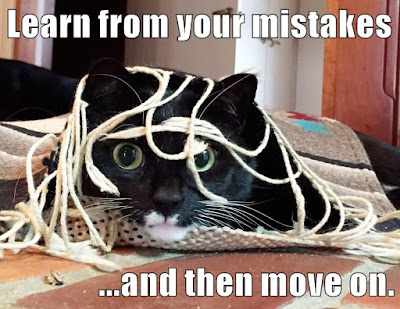Learn from your mistakes
...and then move on.

Talking About Failure Is Crucial for Growth. Here's How to Do It Right by Oset Babur. Published in the New York Times.
This article emphasizes the need to ask for help, both as a way to learn as well as a way to build relationships (the focus is on the workplace). I also really like the idea of different types of failures: preventable failure, complex failure and intelligent failure, with complex failure (due to volatile, unpredictable factors) and intelligent failure (explorations in uncharted territory) being the ones most likely to lead to learning. While in traditional business environments, these kinds of failures might not have been seen as productive, there is a much more proactive learning-from-failure culture in entrepreneurial, start-up culture. I hope we will start to see more of this proactive learning-from-failure approach in school, too. No more punitive grading!
Giving Creative Feedback – A Guide for Those Who Aren’t Creative by Deborah Mause. Published in Inside Higher Ed.
This is an article written in a marcomm context, with the idea that people might be required to give feedback no a graphic design or some other marketing product, even though they themselves don't have any expertise in that field. The advice in this article can be good advice for people in this class giving feedback on creative writing when they might not feel confident as creative writers themselves (yet!). Not all of the pieces of advice are relevant to creative writing, but some of them are; read the article for more details:
Take a breath and gauge your initial reaction.
Now put aside your initial reaction.
Ask probing questions.
Put it all together.
How to Give Praise That Builds Your Child’s Self-Esteem by Amanda Morin. Published at Understood.org.
This article contains a chart with specific examples of process praise that is focused on effort and forward progress. The chart has four columns: "Type of situation" -- "You’re tempted to say..." -- "It’s better to say..." -- "The self-praise connection." The advice is specifically for parents engaging with their children, but there is good advice here for any kind of feedback situation!
(screenshot from the article)

No comments:
Post a Comment
To minimize spam, comments are restricted to Google accounts only. You can also contact me at laurakgibbs@gmail.com or at Twitter: @OnlineCrsLady. Comments on older posts will be moderated.